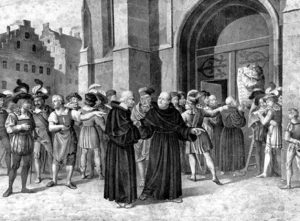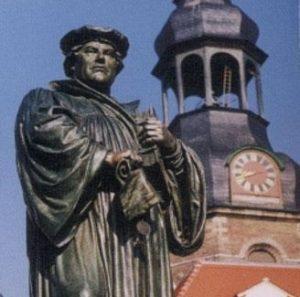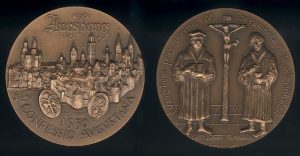It all started in Wittenberg
In March 1617 the Theology Faculty of the University of Wittenberg put forward a new idea: several young professors spoke to the Higher Consistory of Dresden, who had to ask permission from the Prince Elector of Saxony, John George I, to allow a jubilee to be held throughout his territory on the 31st October 1617.It was to be called the “Primus Jubilaeus Lutheranus” (Luther’s First Jubilee) and was to be a solemn anniversary which was celebrated in gratitude to him. There had already been other anniversaries previously in the Protestant academic world. For example the University of Wittenberg had celebrated its centenary in 1602: “ein recht Evangelisch Jubelfest” (a timely jubilee of the Evangelical faith); professors and pastors paraded in the streets, academic lectures and sermons took place. The word “jubilee” had been carefully chosen in opposition to the traditional celebration of “jubilees” which had been used by the Catholic Church ever since its institution by Papal Bull in 1300. The hundredth year after this date was considered a holy year (this was true for the following centenaries too) during this “jubilee” believers could buy “plenary indulgences” for their sins from the Catholic Church.
The 1617 Wittenberg jubilee was different from previous ones in this respect: instead of a general jubilee of the Reformation, a special date (31st October 1517) and a special event in Luther’s life (when he nailed the 95 theses against the indulgences on the door of the chapel in Wittenberg) were now being commemorated: these were the real origins of the Reform Movement. This Protestant jubilee took place at much the same time as the Catholic one (when indulgences were actually being sold). In this light the Wittenberg professors’ plan for a “Luther Jubilee” in 1617 in Saxony could be considered as an act of direct opposition to the Catholic Church and as an ironical imitation of their own corrupt “jubilee”.
Another jubilee took place in the Palatinate
Two weeks later another “Evangelisch Jubelfest” for both Reformed and Lutheran Churches was introduced by the Prince Elector of the Palatinate Frederick V, who belonged to the Reformed Church and was also the head of the Protestant Union of the Holy Roman German Empire, together with his councilors. He had two reasons for this:
Firstly: he needed to strengthen the Protestant Union against the Holy Catholic League which threatened to attack them in the very near future.
Secondly: to declare the full recognition of the Reformed Church, now considered to be as legitimate as the Lutheran Church after the religious Treaty of Augsburg (1555).On 11th April 1617 a meeting was held in Heilbrunn of representatives from the Protestant Union; they decided that Sunday 2nd November 1617 would be an anniversary of the Reformation (Luther and other blessed reformers) and all the benefits which had been brought with it for the Protestants. They also prayed for the continuation of the Evangelical faith.
A grand jubilee
Sadly, the Palatinate Jubilee greatly annoyed the Prince Elector of Saxony, who had based his theology on the Lutheran Book of Concord and refused to be part of the Protestant Union. He decided to go ahead with his own Reformation Jubilee and on the 12th August 1617 he declared that it would be an important Church festival in Saxony, held on the 31st October and also on the 2nd November. Bible readings, texts for sermons and hymns were all prepared for the different services to be held during the jubilee.
This elaborate programme for Saxony concerned nearly all the Lutheran territories including Denmark, Sweden and the towns of Strasburg, Nuremberg and Ulm. In the cities the official ceremonies were conducted by political, ecclesiastical and university authorities. The main themes of the lectures and sermons (which were later published) consisted of essential elements embedded in Evangelical belief, in direct opposition to the Catholic Church. The Saxon jubilee was placed in the context of the end of the world: Luther was seen as the hero announcing the last days of life on earth and the Pope in Rome was seen as the Antichrist.
The word “jubilee” was not in its normal context. For the three preceding centenaries this word had been used by the Catholic Church to mean a time when the debts (of sin) were remitted by buying indulgences. So that if there were no indulgences involved, it was only a “pseudo-jubilee”. Now we can understand why the Protestants reinterpreted the word “jubilee” to correspond to their own beliefs: pastors took the meaning of the word “jubilee” to be found in Leviticus and adapted it to their own context: for the prophet it was to commemorate the liberation of a people who had been formerly held captive: Luther was seen as a new Moses in conflict with the Pope, who was seen as Pharaoh. As they insisted on this idea of a jubilee as a commemoration of Moses’ struggle, it was seen as an opportunity for religious revival.







